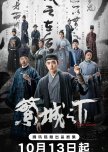
Confucius' last stand.
This drama is about a conspiracy that unfolds during the latter part of the Wanli reign of Ming dynasty, regarded as one of the most prosperous periods in human history. It was the beginning of the end as Wanli's indifference and administrative dysfunction led directly to the downfall of the Ming dynasty. A series of shocking serial killings in Jiangnan has the local Du County yamen scrambling for answers. Each macabrely staged corpse comes with a quote from the Analects of Confucius, a chilling message from the killer.This is a dark story about just how difficult it is to be a decent person, much less one that lives up to.Confucian standards of morality. In a hierarchical feudal society where a scholar's voice drowns out that of a servant and the justice system takes such long detours that it fails even elite rare talents like Judge Song , many inevitably stray down the slippery path of insidious moral compromise. Most of the characters in this story start out as decent people with relatable goals of wanting to improve their lot in life, to set their one true love free, or to right a wrong. For Qu Sangeng, a young bailiff at the yamen, the killings hit too close to home. Hunting down the killer is personal for him but his investigation is hampered by his low rank and treacherous internal yamen politics. With the help of his friends, he manages to connect the killings to a 20-year old arson case where justice may have been subverted. Like his mentor Captain Leng , Sangeng resorts to somewhat questionable methods against some bad actors over the course of his investigation. He soon discovers that point where the end no longer justifies the means and all too easily that line between justice and vengeance becomes blurred. Will he choose to do what's right or succumb to his own worst instincts?
The narrative alternates between two timelines where Lu Zhi and Qu Sangeng are parallel clever characters who are slightly morally flexible and find themselves privy to secrets. Within their sphere of influence is a strong father figure, a scholarly friend and a simpler one with innately stronger moral conviction. The plot is tight and the dialogue is laced with subtle dark humor that fits well with the serious and suspenseful tone of the story. I really appreciate this as too many productions hire big name comedians with exaggerated delivery styles that are jarringly incompatible with the mood of the story. The humourous mocking of too obvious cross dressing was a 10/10 comedy gold moment for me. Mystery buffs will appreciate how the plot keeps you guessing with credible alternate theories that remain in play into the final reveal. The villains are hidden in plain sight, everyone's actions are in character, there are enough clues along the way, the solution makes sense and the ending surprise twist was long foreshadowed. My only slight criticism is some of the character downfalls occur a bit too abruptly and I think the mastermind did have the means to obtain justice in a different way. Even though the ending is fitting and realistic, none of the truly morally upstanding characters get good outcomes. At least one of the deaths was not deserved and unnecessary.
Ning Li anchors this drama as Song Chen, a dark, tortured character full of remorse; betrayed by the system into betraying himself. His heartbreaking struggle to fight monsters without becoming a monster is like watching Confucius' last stand. This character pays tribute to Tang Yin aka Tang Bohu, a renown Ming Dynasty artists and poet. The young actor Yu Yao makes an impression beyond his age with his nuanced, empathetic and chilling portrayal of the young Lu Zhi. While Qu Sangeng is not Bai Yufan's strongest role, he delivers a credible if at times forced performance. This is a wide cast of superb, non-idol actors who pull off complex and captivating portrayals with limited screen time. The bold decision to film in an ancient city and the stunning cinematographic impact of moss drenched walls and vivid rustic countryside and the authentically styled characters all add to the sense of immersion. The drama's visual composition style conveys a suspenseful ambience, a feeling of subtle decay and an air of injustice that belies the vibrant prosperity of Du County. Overall, a superb debut production by filmmaker and screenwriter Zheng Wang that eschews tired tropes. This is a director that has something to say and he tells a riveting and resonating story about justice and morality that leaves food for thought at the end.
This is one of the best ancient suspense thrillers I have watched in a long time and one that hard core mystery buffs can lose themselves in. A highly recommended 9/10 from me.
Was this review helpful to you?
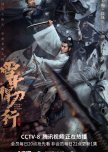
Be the chess player, not the chess piece.
Sword Snow Stride evokes all my best wuxia memories; action, adventure, chivalry, an old murder mystery, political intrigue and a dash of romance and a medley of eccentric surrounding characters with astounding martial arts capabilities.Set in a fantasy world, Xu Fengnian is the son and heir of the fearsome warlord Xu Xiao, king of North Liang, Liyang's largest and most powerful fiefdom. Adapted from 烽火戏诸侯 Feng Huo Xi Zhu Hou's epic 20 volume novel The Snowy Path of the Heroic Blade 雪中悍刀行, this first instalment focuses on the coming of age of main protagonist Xu Fengnian.Anchored by Zhang Ruoyun and adapted by Wang Juan of Joy of Life fame, this was one of 2021's most anticipated dramas and for me, it did not disappoint. The leisurely pace at which the plot unfolds gives the viewer the time to imbibe the rich complexity of the interplay between characters and their relationship dynamics. Wang Juan has taken his writing to a new level, delivering a crisp dialogue that gives the first impression of wit and occasionally irreverent humour that masks profound layers of hidden meaning, wisdom and emotions in conversations within conversations. This is most evident in Fengnian and Jiang Ni's delicious repartees but it also underlies multiple exchanges between Xu Xiao and Fengnian and belie numerous other superficially adversarial relationships. This requires a level of sophistication and nuance in the portrayals that is only done justice by the more experienced actors.This is unfortunate for Li Gengxi whose lack of experience is evident in her immature and shallow rendition of the marvellously atypical Jiang Ni. Despite some endearing moments, she does not "own" the character quite the same way Zhang Ruoyun is Xu Fengnian but he is a tough act to follow and not a fair comparison for a young actress. She warms to the role considerably in the latter half and I would be happy to see her return for the second season.
Do not be deterred by the fact that this drama did not live up to the high expectations of Chinese viewers, whose main issues are with the slow pace, the choice of female lead and the slo mo action scenes. It is true that the direction of some scenes, in particular action scenes could have been better. While the director wanted viewers to appreciate the grace, artistry and difficulty of the actors movements, the end result is the scenes lack the intensity and thrill of imminent peril. This is understandably a dealbreaker for some hard core wuxia action fans but it didn't really bother me. As the drama progresses, there is some speeding up of the fight scenes that are boosted by Marvel universe like CGI. The final encounter is spectacularly ferocious, thrilling and violent enough to satisfy most critics.
The drama opens with the roguish young Xu Fengnian living in the moment while traipsing the world with his groom Old Huang. He is not comfortable with his father's ruthless tactics and eschews his legacy, one that puts him in the crosshairs of those in the highest circles of power. While Fengnian draws inspiration from many mentors, Xu Xiao and Old Huang are by far his most important early influencers. An unconventional thinker, Fengnian refuses to compromise, strives for win win outcomes but does not hesitate to be ruthless when he needs to be. As he steps up into his role, he starts out as a mere chess piece in a high stakes game where his father Xu Xiao is many steps ahead. Along the way, he grows to be the chess player, not the chess piece. He also better understands his father's choices and become more like his father in some aspects. Zhang Ruoyun and Hu Jun have great chemistry and I found their unorthodox banter and relationship hilarious and moving; we really didn't get enough of them together! This must be Zhang Ruoyun's best role, I enjoyed both his portrayal and Xu Fengnian the character even better than his fabulous Fan Xian in Joy of Life.
While Fengnian starts out protected by his father's retainers, he manages to win hearts and minds using his own unique methods and inducements and finds himself surrounded by a formidable entourage of martial artists, retainers and maids with mysterious pasts; leaving a string of alliances and favours owed in his wake. These are classic wuxia archetype characters that make me shiver with delight at their single minded obsession with the quest for supremacy that comes with inevitable sacrifice and regret; who willingly barter their swords and their lives to advance or to honor past promises or debts. While the story revolves around Xu Fengnian, so many of these surrounding master swordsmen captured my heart and imagination with their prowess and their backstories from the laconic and lethal White Fox, Old Huang, Qing Niao and of course Sword God Li Chungang. The many awe inspiring female swordsman makes it hard for Jiang Ni to really shine and leaves the indelible impression that Fengnian is a man with a fleet of many ships.
It is said that a hero is only as good as its villain and in Zhao Kai, Liu Duanduan explores a deeper villain, a riveting opposite character to Xu Fengnian.and pulls off an oddly empathetic antagonist that practically steals the show. They are both scheming and ruthless characters who attempt to escape their destiny but that is where their similarities end. Zhao Kai is utterly lacking in moral fibre and can only win by foul means ,regardless of consequences or how many must die. He is dangerously and humorously self aware of this and stalks Xu Fengnian looking to exploit a moment of weakness. He won my heart with his unabashed appreciation of Xu Fengnian's brilliance and insight; were their goals not in such conflict, Zhao Kai would be Xu Fengnian's greatest fan. It is a great pity Zhao Kai is not an out of box thinker that could have found a way to align his interest with that of Fengnian. Even though Zhao Kai is far from the most powerful antagonist, a big chunk of the season one plot revolves around his pursuit of Xu Fengnian.
Season one draws to a very satisfying conclusion with an epic and very satisfying showdown and major immediate tasks achieved. It leaves me hungering for more but not in that awful cliffhanger kind of way. It will undoubtedly take a few years for season two to materialise but even if it doesn't, we can still think of this as an immensely enjoyable and very satisfying slice of life kind of drama. This is the second 9.5 from me for 2021 that closes the year on the same high note that Word of Honor started it on.
Was this review helpful to you?

Like a mucus bath.
Don't be fooled by this drama's engaging start - a hint of intrigue, the promise of adventure, a powerful secret weapon, political conspiracies aplenty and a heart stopping romance between a intrepid princess and a valiant guard. After about a dozen thrilling episodes this drama turns so icky that it feels like a mucus bath.Instead of the incomprehensible Rebirth For You, this drama's real title should be The Story of Miaorong. Because over 30 super long episodes (50+ minutes), practically all of the screen time is hijacked by the deranged machinations of the female and male love rejects' pathetic, slimy and absurd schemes. Every time you are about to jump ship out of frustration, they will throw some sugar at you with some sweet scenes between Bao Ning and Li Qian but make no mistake, the very boring actress that plays Miaorong gets MOST of the screentime. The final insult to the injury is this smart couple becomes stupid and their devotion and absolute faith in each other devolves into angsty and immature misunderstandings toward the end. The promising plot threads and interesting antagonists are left largely under exploited while the writers strive to bore us to death with every silly, malicious cat fight and scorned lover trope ever conceived of. This is a total waste of both Ju Jingyi and Zeng Shunxi's acting talent and is little more than a shameless exercise in letting second rate actors get too much exposure.
If you are die hard fans, watch about the first twelve episodes and the last one or two. All the rest can be skipped but my overall recommendation is to save some brain cells and not watch this at all. This is my shortest review ever to avoid wasting any more time on this abomination. Rating 3.5/10.0.
Was this review helpful to you?

Hell hath no fury like a woman scorned.
This excellent adaption of one of Gu Long's best known works 绝代双骄 is also known as peerless or legendary twins. The cringey English title is a shameless bid to advertise the main leads as eye candy idol actors. This delightful romp through jianghu is faithful to the original story and checks all the boxes in terms of what a true blue wuxia ought to be.This is a typical Gu Long plot structured around one overarching conspiracy that comes to light after the main protagonists encounter many adventures and solve a few smaller related mysteries. A woman scorned by unrequited love sets out to extract a terrible vengeance by separating twin brothers at birth and raising them to kill or be killed by each other. As the leader of the powerful Yihua Palace, she raises one of the brothers Hua Wuque (Hu Yitian) to be a stellar martial artist whose mission is to hunt down and personally kill the wicked Jiang Xiaoyu. Wuque is a handsome, refined and righteous but overly naive and reserved young man who is the spitting image of his father Jiang Feng.
Wuque's brother Jiang Xiaoyu (Chen Zheyuan) is rescued by Jiang Feng's sworn brother legendary swordsman Yan Nantian and grows up under the influence of the ten great villains of Wicked Canyon. He is renown for his intelligence (mostly due to self praise) and is a lively, charismatic and healthily skeptical young rogue. Less skilled than Wuque, he relies on his deviousness to squirm out of tight situations. He is a determined bachelor that evades several persistent young women before meeting his match in wit and resourcefulness. This embroils him in several romantic entanglements and triangles. During his many colorful adventures, his path crosses with Wuque and they become friends and allies. Together they tackle their main antagonist, the scheming Jiang Biehe and his son Jiang Yulang. Despite their disparate upbringings and appearing on surface to to be polar opposites, both brothers are innately good natured and have common values that bind them in a deep friendship. Nonetheless in accordance with jianghu code of conduct, they must fulfill their vow to face each other in a predestined duel to the death.
The plot and the many archetypal characters in this well known story may seem tropey and unoriginal but Gu Long was one of the pioneers of the modern wuxia genre. If this feels familiar or like something you have watched before, it is more likely those stories or characters were influenced by this rather than the other way around. It is easy to follow because the audience is usually one step ahead of both protagonists and antagonists and knows the big secret that they are brothers. It is a favorite of mine because the overused revenge trope is handled compassionately and does not devolve into simply just an eye for an eye. All of Gu Long's women are capable of being frighteningly single minded in love, unscrupulous, vindictive and utterly ruthless and unforgiving. One of these bad-ass ladies always gets the guy but this is from the 1950s so while there is romance, it is very chaste by today's standards.
I was really impressed by the cast. Many important roles were played by young and upcoming actors and this was very obvious in the first 4 episodes. After that, almost everyone got into character and it came together quite well. While Chen Zheyuan somewhat overacted Jiang Xiaoyu, he is a very versatile and charismatic young actor. He just needs to not try so hard, be a bit more nuanced and develop his own style. Similarly Hu Yitian's Hua Wuque was a bit too restrained or underacted initially. But they had great chemistry and really excelled at showing us how the brothers grew to become more alike as they got to know each other. I must also mention the awesome cat and mouse encounters between Jiang Yulang and Jiang Xiaoyu - what an excellent villain! I actually found this to be the best acted, most nuanced main role.
Finally in terms of what makes or breaks any wuxia it is the fight scenes. These really knocked the ball out of the park - they were truly awesome - excitingly and powerfully choreographed with the right balance between stills, slow motion and non-stop movement. And naturally it is Gu Long so it is a total feast in terms of the number of heart stopping lethal clashes between some very colorful, slightly eccentric martial arts champions with wildly improbable combat abilities. I love this stuff and immediately rewound and re-watched each epic clash.
What a fun, well paced, light heart-ed and engaging wuxia. I wish all adaptations of the classic, best loved Gu Long and Jin Yong wuxias get this kind of quality remake. Two thumbs up!
Was this review helpful to you?

House of cards.
My Journey to You is dark, intricate and suspenseful wuxia that hones in on Wufeng spy Yun Weishan's mission to sneak into the Gong family's heavily guarded mountain stronghold. This is a once in two decade opportunity, as the Gong family holds a bride selection event for their young masters who have come of age. A shocking twist thrusts Gong Ziyu, the least capable young master, to the helm of the family. He is clearly unequal to the task and must prove himself worthy before the seemingly invincible Gong family folds like a house of cards under the force of internal and external challenge.Shocking murders that rock the foundations of Gong family just as Wufeng spies slip through the gates. The whydunit is quite clear from the get go. By elimination and a few clues, most of the mysteries including Wuming or Anonymous's identity, are easy to solve. The mysteries look more complex than they really are because many other sub-plots unfold at high velocity. The key is not to over think; the straightforward answers are usually the right ones. The antagonist reveal comes late in the story after the facts are stale and the long expository style gives a sense of anti-climax at the end. It may have been better to resolve the internal conspiracy prior to facing the external challenge. Nonetheless the mystery sub-plots are fairly tight and engagingly woven into the external plot of this dark wuxia.
The real guts of the main plot centres around the Gong family and the secret that they vowed to safeguard for all time. It is no fun to be a Gong; stuck on an isolated, toxic mountain and locked in an existential battle with their arch enemy Wufeng. All of the young masters of the Shang (weapons), Jue (commerce), Zhi (poison) and Yu (defence) lines shoulder many responsibilities from a young age. All except the self-indulgent and spoiled Ziyu who has a father, foster mother and older brother to lean on. It is no wonder that Shangjue and especially Yuanzhi resent Ziyu and demand he prove his mettle. The real irony is Sword Wielder is the most sucky job that comes with a butt ugly tattoo and life imprisonment on that dreadful, suffocating mountain. Not to mention the exhausting chore of trying to stare, glare or scowl down Shangjue and Yuanzhi only to be torpedoed by one of Zishang's whacky, mind boggling non-sequiturs that destroy any crushing come back! As much as I was riveted by the Gong family soap opera, it is the mysterious denizens of the back mountain that broke my heart with the intensity and absoluteness of their obsessions. This drama has the most absurdly gorgeous, eccentric, layered and memorable cast of characters.
While romance is always a feature, it is never what this kind of dark themed wuxia is built around, so conventional romance watchers are bound to be disappointed. Both Weishan and Qian are spies on a do or die mission. If they have love brains, they'd have been long dead spies. By design, Shangjue and Qian's relationship is more interesting because Shangjue is a more cynical and questioning character than Ziyu. He is a much more difficult target and this forces Qian to take more risks and thus reveal more of herself to captivate him. It is quite clear there is an intense attraction, that they got their hooks into each other. It is a dark and fascinatingly toxic relationship where it is left for the viewer to decide whether and to what degree they actually fall in love.
In sharp contrast, Ziyu is naive and unquestioning. Weishan is his first love and he falls for her like a ton of bricks, absolutely and unconditionally. The feeling may be intense and pure but it is also uncomplicated and not that differentiated. The bigger problem is that Weishan is by design an elusive character. She does not have to reveal much about herself to reel Ziyu in and so for the most part, she remains a blank character. By the end of the drama, she is still so much a mystery that it is difficult for viewers to be that invested in her and thus the main romance. Yun Weishan is the main character but because she is so hidden, it is as if there is no main character or CP that anchors the story. For the most part, this feels a story about many characters told from many different points of views. To me, this is the biggest shortcoming in the narrative that is saved by the presence of many other fully realised characters. This is not completely a bad thing because it allows the entire spectacular cast, and notably Cheng Lei, Lu Yuxiao and Tian Jiarui, to really shine without taking away that much from Yu Shuxin and Zhang Linghe. All of the actors got the screen time their characters deserve and deliver all around strong performances.
In terms of cinematography, breathtaking action scenes and stunning aesthetics, this drama is everything I expect of Guo Jingming and more. He is the ultimate connoisseur of male beauty and truly immortalises all of these actors, male and female at the peak of their gorgeousness at their most flattering camera angles. Yue (Moon) Gongzi was the one that stood out for me in this visual feast and his love story moved me most - I'd have gone to the moon and back for him any day of the week! Despite some holes, I am overall very satisfied with the writing. I much enjoyed the witty repartee, the foreshadowing and the layers in the dialogue and many hidden clues in the form of riddles and homonyms that are embedded in the script.
I actually quite like the ending epilogue which has caused quite a bit of consternation and heated discussion among viewers. This is a plot driven story so none of the main characters are the end game. Both main plot lines converge to deliver a very complete ending in terms of th narrative, which is merely one mission or chapter in the saga of Wufeng's longstanding rivalry with the Gong family. The end epilogue closes with just the right dark and chilling note that upon reflection was long foreshadowed, makes sense and is completely in character. As such, I am very happy to rate this 9/10.
I will elaborate further on the ending epilogue in a spoiler below but please don't read it until you have finished watching this drama. This drama is best enjoyed without spoilers so please don't scroll down until you are done watching.
WARNING!!! Major ending spoiler below!!!
Yun Weishan returns to Wufeng to face the music because her work is not done. The biggest clue is that she is not that surprised to find Wufeng waiting for her. She allows Ziyu to think she chose freedom over him, so that he does not look for her and endanger himself and his duty to protect the Infinite Fire. Beyond that, she also knew the note was not from Yasi and possibly she always knew about her twin. More than the Fortnight Flies, that may have been Wufeng's real hold over her. If you rewatch the opening scene, it is very suggestive. Yasi quickly reassures her that the Yun family was just knocked out and not harmed. So it is important to Weishan they are not harmed yet she is not curious enough to even look at the bride she is replacing. Why? Because it is her twin, she already knows what she looks like.
The bigger reason she returns to Wufeng is revenge. She is probably quite safe from Wufeng because everyone that knows of her betrayal is dead and Qian was the one who actually leaked all of the information that lured Wufeng in. She told Jin Fan the truth about Zhuomei, just not the whole truth. She may even be Zhuomei's daughter. That is why she was taught all of Qingfeng's top martial arts but Qian was not. Neither of them even got close to Dianzhu/Wufeng's leader so they could not have learned Qingfeng sect's top martial arts from Dianzhu. Weishan probably joined Wufeng to avenge Zhuomei and possibly also free her sister. She simply could not stay with Ziyu in Gongmen because her work is not yet done. But the first chapter of her story can be considered complete.
A second season probably reunites Weishan with Qian because Dianzhu is their common enemy. This is also why Qian leaves Gongmen, she also has a mission more important than love. Another season could well take place entirely outside of Gongmen so it is not clear the entire cast needs to return. Given how popular the Gong family is with audiences however, my guess is if they can reunite everyone they will bring it all back to Gongmen. But they can also continue it outside of Gongmen with only Shangjue returning or Ziyu returning after handing the reins over to Shangjue. This is very smart of Guo Jingming. He left all his options open. Including the option of not proceeding with another season.
Was this review helpful to you?

Karma is a Court Lady.
Billed as a love story between a reformed rake Sheng Chumu and a court lady Fu Rou, this is really an opulent tragicomedy about the succession turmoil that plagued the latter years of Li Shimin/Tang Taizong's reign. It is a surprisingly empathetic and riveting portrayal of the greatest Tang emperor's disappointing and much reviled crown prince Li Chengqian. It strikes me that his story is what the writer really set out to tell; all the other parallel sub-plots are much more indifferently written.The way the drama is promoted as Fu Rou and Sheng Chumu's love story is misleading and misinforms audience expectations. Yes, I know how adorable they look together but their story is rather pedestrian and is not the main meal so they end up spending an incredible amount of time apart. Neither character has free will and their romance does not drive the narrative; it is in fact subordinated to and frustrated by the main succession plot. That is necessary as these two main parallel, interlocking plots are related primarily from Fu Rou's perspective as a court lady or official 女官 with close access to the workings of the inner palace and the imperial family's private moments.
Although Fu Rou is the eponymous character with the most screen time, this is a cardboard character that is made worse by Li Yitong's anodyne, colourless portrayal. Fu Rou is pretty much superwoman - an incredibly talented, resourceful and daring fixer who finds herself in the middle of every palace conflict large and small. She comes to the aid of anyone that appeals to her bleeding heart, taking on matters well above her pay grade. She has the temerity to lecture and chastise anyone and everyone from lowly palace servants to the emperor himself! I would have loved this character to death if she had a bit of a dark side, an odd hobby or even some tiny flaw like picking her nose in public or something, anything. But no, Fu Rou is a suffocating paragon of virtue, moral rectitude and forgiveness; who genuinely believes that good deeds begets positive karma that pays off in the long run. But if karma is a bitch, then her title is court lady because there are heinous, irreversible and tragic unintended consequences to Fu Rou's meddling and her indiscriminate assistance to wicked people. Due to editing/censorship issues, we never get see Fu Rou reflect upon the folly and irony of her interventions or experience any sense of remorse or regret. Thus there is no character development and by the end Fu Rou to me is just a vapid, righteous prig of a character that I most resent - poor Chumu is so much better off remaining Changán's most notorious playboy.
In sharp contrast, Xu Kai's Chumu is a much more engaging, funny, relatable and outside of a lapse in the middle; a smart character that undergoes tremendous growth. It is a pity he gets so little screen time because he has a wonderful ability to just casually infuse a moment with comic relief. The comical antics of the gruffly hilarious Sheng Xianjing, Chumu, Chuling (shout out to the very funny Kris Fan), the gamine Princess Xinnan and Prince Han go a long way toward diffusing the dark undertones to the drama. Nothing made me laugh harder than Princess Xinnan balancing those dastardly bowls. Unfortunately the denizens of the inner palace and especially Fu Rou and Prince Zhou are humorlessly written and portrayed, resulting in some stifling and overly angsty inner palace arcs and a notable darkening of the overall mood in the second half.
With five or six couples, there is at surface a lot of romance in this drama but they are mostly flawed, complex and maddening relationships. This is due to the surfeit of unsavory, corrupt and chauvinistic male characters, from stalkers to lechers and murderers who simply cannot take no for an answer and lame brained female characters willing to indulge their flaws. As a result, most of the ships are leaky and not seaworthy enough to survive stormy seas. These messy, disturbing love-hate relationships are not consistently well written and there are arguably too many of them. That said, these characterizations are compatible with the times and the illogical pairings seem to curiously "work". They are certainly far more interesting than the usual lighthearted and fluffy standard fare of secondary romances.
The main appeal of this drama for me is Li Shimin, Tang Taizong's succession story, which I feel is what this drama is really about and it is compellingly portrayed. For a fictionalized account that takes a fair amount of literary license, it captures the essence of the main historical figures and remains astonishingly true to the important events of the day. The one dark stain in Li Shimin's history was the Xuanwu Gate Incident, where he personally killed both his brothers from the same mother and forced his father to abdicate in his favor. He went on to be a benevolent and revered emperor, one of the greatest in history. This drama is set in his twilight years as history appears to be on the brink of repeating itself. It is an intimate, at times a scathing expose on the insufferable privilege of imperialism and at times a compassionate account of how impotent, conflicted and utterly terrified this emperor and his beloved empress must have felt as they watch their sons at each others throats. In all the moments that count within this main arc, the writing holds up although towards the end when everything comes together, it is quite obvious that some scenes were lost to censorship.
The most phenomenal, multi-faceted and evocative performance that stands out among an absolutely fabulous cast is Li Zefeng's portrayal of the crown prince. I find it unfathomable that I have not noticed this actor before. He starts out as the highly regarded crown prince, showing so much promise and closely allied with his brother Prince Han. But he is slowly cracking under the immense pressure of being crown prince under the exacting eye of his father and the court and constantly measured up against his other talented brothers. The acting was so good I could understand why he sought refuge in frivolous pursuits and why he needed Chenji. I was surprised by how openly and sympathetically their taboo relationship is explored. It is the relationship that moved me the most, I grieved with him when it ended and I could see how he unraveled and gave in to his worst instincts. Prince Han is the other well written and well acted role. It is tragically comical how their sibling rivalry blew them up and I love how their bond is depicted with a multitude of emotions and a good dose of irony and humor.
I enjoyed this gorgeous and expensive production quite a bit although the story is quite dark and there are too many distracting sub plots and frustrating characters. Although the writing is at times lazy, fantastic acting by the veteran cast more than makes up for it. But it is definitely not the kind of story most viewers thought they would be watching when they picked this up and it definitely will not appeal to everyone. I enjoyed it enough to give it an 8.0 and would probably rate it quite a bit higher if they had diminished Fu Rou's role.
Was this review helpful to you?
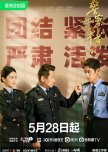
The sum of ordinary is great.
Wow. I did not expect to enjoy this drama so much. In fact I didn't expect to get past the first episode. But I just had to check it out for the spectacular cast. And I am well chuffed that I did. It is the most eloquent and engaging low concept drama made in years.Wang Shouyi is chief of the chronically short staffed Bailihe People's Police station. With a 93.4pct community satisfaction rate, they rank 144 out of 163 in the district. These are not elite cops trying to solve major crimes. They are just ordinary cops that grapple with mundane, daily cases from petty crimes to heated community spats. The denizens of their community are a loud, colorful, chaotic, demanding, often ignorant, unreasonable and utterly exasperating lot. This is written authentically with a strong dose of humor and irony that garners big laughs from small things such as an absurdly moving case of diaper theft. It is an intricate, intimate account of the broad array of everyday social pressures experienced by Chinese society. This brilliant, unglamorous drama that feels like a shared coming-of-age experience traverses the bleakest, most flawed to the greatest, most compassionate aspects of humanity.
Wang Jingchun's canny Chief Wang is the star of the show. He badgers his director into assigning four new recruits with diverse abilities and backgrounds to his station. With wisdom and perspicacity, he assigns an experienced mentor to each of the bright eyed and bushy tailed young recruits. This excess of greenness and enthusiasm is met with a mixture of annoyance and trepidation by the battle hardened veterans. Prodded along wisely past hiccups by Chief Wang, adjustments are needed on both sides to make these seemingly random pairings work out. Over time, their shared trials and triumphs end up being a catalyst for character growth all around.
Xia Jie's father, the former well loved chief of Bailihe station perished in the line of duty ten years ago. Her mentor Cheng Hao was mentored by her father and like Xia Jie, seeks closure from what happened so long ago. She is treated like a protected species by her father's comrades and her mom hounds the station to keep her out of harm's way. My blood boils every time her mom goes on a rampage. But as much as I am frustrated and angry at her, I can't help but be moved by her sheer terror and deep sorrow, at how time did not ameliorate the shock and intensity of her loss. I really applaud Bai Lu for her true to life portrayal of Xia Jie's struggle to make peace with the past, find meaning in her role at the station and build life bonds with her peers. I also love that the drama only hints of awareness that could blossom into romance down the road but keeps the primary focus on the camaraderie and burgeoning mutual understanding that turns the four young friends into found family.
Liu Dawei is the other super solid characterisation of a young cop with rough edges that offers the barest glimpses of another Chief Wang in the making several decades down the road. On paper, he is the least promising recruit, a trouble maker at the bottom of his enrolment class. But he has high EQ and it is as much his kind nature as his inherent nosiness that gets him embroiled in everyone's business. His mentor Chen Xinsheng is initially very irritated to be saddled with this brash and over talkative young man with an instinct to rush headlong into danger. Their relationship and how it evolves on multiple fronts and interlocks with the other characters is the best written and portrayed dynamic in the drama. This is not at all surprising that magic happens when you put together immersive and versatile actors of Zhang Ruoyun and Ning Li's caliber.
Xu Kaicheng also delivers a very respectable performance as the book smart Yang Shu, the perfect foil for the street smart Liu Dawei. His struggles with Cao Jianjun his ethically flexible mentor with hero complex, is forced at some emotionally complex moments but overall comes off well. He is surprisingly good at comedy - I laughed the hardest when he is pimped out by the station as an undercover gigolo. I also much enjoyed the stingy Zhao Jiwei's great relish and talent for self criticism and his eye for detail in the cracking of the diaper theft case. This memorable ensemble cast would not be as well rounded out or grounded in reality without Zhao Jiwei and his mentor Zhang Zhijie's focus on how it is the small things that make the biggest difference.
This slice of life drama is far from a fairytale - It doesn't try to suggest that life is fair or bad things don't happen to good people. It resonates because it is simply about coping with life's daily challenges. The outcomes are not always just and success and failure do not necessarily correlated with good or right decisions. All four of these young recruits come with baggage and are mentored by battle scarred veterans with their own issues. Their flaws and personal traumas enable them to process and respond to situations with compassion and compromise and thus not always to the full letter of the law. They may just be ordinary cops trying to be their best selves but together they prove that the sum of ordinary is great.
It is normal for these types of slice of life character dramas to be light on plot but the final arcs do dial up the complexity and intensity of the cases as the young recruits gain experience. While the drama does end at a climax, I would have preferred that they ended this on the penultimate gaslighting/cyber crime case. This drama was never about heroes so I am not sure we need to see history repeat itself with another Xia Jie in the making ten years down the road. It isn't a bad final arc at all it just strikes a bit of an odd note with the rest of the drama. That does not change that this is an immensely enjoyable story that made me reflect a bit, laugh a lot and tear up occasionally. I am rating it my first 9.0 for 2022.
Was this review helpful to you?

True Lies
This must watch crime drama hooked me from the start and commanded my undivided attention till the end. My review is going to be brief because for this drama, spoilers will vastly diminish your viewing experience so best steer clear of the threads until you are done.Three children from broken families - Zhu Chao Yang (Rong Zishan), Yan Liang (Shi Pengyao) and Yue Pu (Wang Shengdi) accidentally record footage of a murder in progress. They bite off more than they can chew when they go toe to toe with the murderer in a deadly cat and mouse chess game that could lead to mutually assured destruction. This is brilliantly written and superbly acted, with dynamic relationships, complex emotions and mirror lead antagonists. The sophisticated and nuanced performances of all three child actors and notably Rong Zishan are impressive beyond words. They are surrounded by a veteran cast that deftly portrays realistic, empathetic characters with very human failings. This is a dark story about how social and familial pressure and occasionally just darn bad luck can make people do both deeply moving and terrifyingly chilling things. The suspense builds naturally as a result of gripping storytelling and acting and is not artificially induced by music.
As a mystery buff, I have loved the unreliable narrator style of storytelling since I read Agatha Christie's "The Murder of Roger Ackroyd". The kind of darkness of human nature explored in this drama also coincides with my other Christie favorite "Crooked House" so this drama checks all my boxes. However, the adaption of this type of narrative style to film is incredibly difficult and usually disappointing - the movie version of Ian McEwan's Atonement is a classic example. So I am just bowled over by how meticulously and insidiously well executed The Bad Kids is. Even if you watch this without blinking, you will inevitably miss many of the true lies and scratch your head as to when and where the lines between fact and fantasy get blurred. There is no shocking "Aha!" moment - indeed initially I was convinced with and unquestioning of my first impression of what happened. I fell for the fairy tale hook, line and sinker. And then insidiously, all the alternate possibilities started to creep up upon me and drew me into re-watching. I watched this two times and and parts of it more than that and yet the ambiguities and different possibilities persist. That is actually what is fascinating, thrilling, chilling and absolutely mind blowing about this experience.
Of course there are some mild logic flaws but this is truly so well executed there is little to pick at without being petty. I can't praise this enough, it has to be the best crime/mystery I have watched as of June 2020. It can hold its own relative to the best in class of this genre not just in China but anywhere and everywhere. Two thumbs up!!!
Was this review helpful to you?

Behind every great man is a woman rolling her eyes.
New Life Begins is a fun and funny satire that mocks ancient Chinese feudal society. It is set in the fictional kingdom of Xinchuan, which presides over eight other provinces or chuans. Xinchuan is the poster child for every deplorable aspect of the feudal patriarchal society that prevailed over most of China's 5000 years of recorded history. Every three years as tribute, eligible young beauties from the provinces are sent for selection as wives or concubines of the Xinchuan princes. As these poor unsuspecting scions pore gleefully over bride portraits, little do they know that the very foundation of their kingdom and beliefs are about to be rocked to its chauvanist core.As fate would decree, subversive elements infiltrate that year's bride candidates. These elements are woefully untaught and unteachable in the Rules of Reverent Submission for Women. The kind of marriage envisioned by the Xinchaun royalty could not be further from their minds. The ringleader is Li Wei, a deceptively harmless foodie from Jichuan, an inconsequential province where men and women are equal and monogamous. She finds kindred souls in the scheming Hao Jia, the fierce Shangguan Jing and the savvy and ambitious Yuan Ying. Together, they prevail against the suffocating, often life threatening strictures of the Xinchuan inner palace to carve out an existence with some free will. Their brave and hilarious exploits resonate with the oppressed and fuels a fire across the inner palace and then, the capital. As it turns out, behind every great man in Xinchuan is a woman rolling her eyes. Despite the period setting, the ideals in this drama are very modern. It is a very fantastical utopian depiction of the kind of power women can unleash by simply working together instead of turning on one another.
This is not to say that all ten of the Xinchuan princes are bad fellows even though most of them make exceedingly bad husbands. With some, it is simply a matter of training while others need to be kicked to the furthest corners of the empire. The commercially savvy playboy Prince An who thinks he is the sun that the solar system revolves around when he is really the moon is the caricature that made me laugh hardest. That said, the entire ensemble cast delivers rib-tickling and lively comedic sketches that poke fun at the mundane. In a mostly lighthearted and positive but rather cursory manner, the drama evokes many women's themes. Hua Jia's arc is the darkest and most complex one and sounds a dire warning about disgruntled female employees. The sub-plots are short and even though the villains made my blood boil, they are not that smart or complex. That is because the true villain is the tyranny of the patriarchal feudal system and they are all victims of its shortcomings.
All of the sub-plots unfold around the evolution of the relationship between Li Wei and Yin Zheng, the unfavored sixth prince. Hilarity ensues when this woman who lives to eat finds herself shackled to a man who eats to live! With the help of MVP Butler Su, she attempts to tease out the inner fat dude just waiting to burst out of Yin Zheng. In fact, food is her secret weapon; she worms her way into practically everyone's hearts through their stomachs. Both Bai Jingting and Tian Xiwei have good comedic expression and they are fantastic at seamlessly turning funny moments into heart stopping passionate ones. While theirs is a fun, wholesome story, it is too much of a fairy tale. Neither of them have serious flaws and every cloud has a silver lining. In fact Li Wei's perpetual chirpiness grated on me at times. While Yuan Ying is a fabulous and formidable character and I get that one woman's treasure is another's trash, that entire situation is just too good to be true. I also didn't like how their relationship jumps from courtship to the comfortable rhythm of a long married couple, deferring the best romance part till the end. It breaks the natural momentum of a relationship and distracts audience attention from the other arcs. In truth, this drama is a lot more about sisterhood and women's themes than it is about romance. The production should be more confident that these well written, funny, and touching arcs can engage on their own without dragging out the romance to keep viewers invested.
This is one of the rare times that it is the second couple, Shangguan and Yin Qi that stole my heart. I have a weakness for flawed, colorful and unconventional characters like these. Yin Qi's plight is far worst than Yin Zheng's - he is just as unloved and he is no great talent to boot. In the bride lottery, he finds himself sacrificed to the fierce Shangguan, a princess from the powerful and matrilocal Danchuan. But he has a giant heart to go with his big goofy happy-go-lucky smile that makes the fiery Shangguan forgive him for always saying wrong things. Their clashes and banter made my shoulders quiver with laughter as they humorously navigate true challenges and hardships together. Even though they are not perfect and don't have everything, I somehow get the feeling they couldn't be happier.
Overall this is a gorgeous, lighthearted and highly enjoyable story about women's struggles and sisterhood with some romance thrown in. It lacks depth, is slow in places and is far from a masterpiece but the humour is very well done and has mass appeal. A highly recommended watch that I rate 8.5/10.0.
Was this review helpful to you?

The Plagiarist Cookbook
Who Rules the World is based on a well-loved, strong female centric novel that is normally my kind of story. However, the drama adaptation was undermined by the mid-production departure of the director and a key scriptwriter in the bitter aftermath of over fraternisation between production staff. It is clear that the drama was salvaged by borrowing heavily from other dramas and accusations of plagiarism have further weighed on the reception. I watched this for lack of anything better but to my surprise, it comes together quite well. It is indubitably the result of The Plagiarist Cookbook and is best enjoyed with a sense of humor for its stirring romance and parody plot.This drama starts strongly, promising a sensational fusion of romance, wuxia, palace intrigue and art of war. Set in a fictional Dadong empire, the Empyrean Token, which vests the imperial family with the mandate to rule mysteriously disappears, sending the empire onto the brink of war. All six vassal states vie to recover the token and potentially seize power. Longtime friendly rivals and top martial artists Bai Fengxi and Hei Fengxi get dragged into the fray as they stumble across a string of inexplicable killings. Together, they discover a sect with shadowy motives that could be linked to the struggle for control of Dadong. Behind their carefree jianghu personas, they both conceal identities with vested interests in the coming battle to decide who rules the world. Can their romance survive the battle for a new world order?
This drama's strongest selling point is Bai Fengxi and Hei Fengxi; they are simply the most awesome jianghu power couple. I was expecting more of the same old, same old Zhao Lusi. And my first impression of Yang Yang in what looked like Wang Yibo's hand-me-down Legend of Fei wig was meh, just another idol actor with a sharp, useless look about him. So to my surprise and delight, I enjoyed Lusi and Yang Yang's combined chemistry immensely. I love that their romance develops after years of friendly competition, when they are both secure, fully realised beings. Their relationship dynamics are captured in as much in their witty banter as in the nonverbal communication of their eyes, facial expressions and small gestures. They make for such a stunning looking couple with 夫妻相/fū qī xiàng or the look of a couple that it is hard not to root for them. That said, their relationship is mature and already perfect. They are on the same wavelength with mutual understanding that even in the matter of their secret identities, the reveal is in each case rather anti-climatic; an unimportant and unsurprising detail. While they experience many challenges together, most of the time they sail through them so effortlessly that the intensity is diminished. Since the drama is all about this couple, as charming as it is, their relationship after awhile feels static.
I really like how the smart women (to be clear, that means excluding Langhua) are portrayed in this drama. They are clever, independent and capable decision makers who don't succumb to the dumbest and most boring love rival tropes. Yet ultimately this is not the strong female-centric story I was expecting as it is much more Lanxi's story than it is Xiyun's story. Which is a shame because Lusi really takes her acting to another level in her portrayal of an indomitable and powerful character who cries as persuasively as she laughs and whose stomach is a bottomless pit. Her comedic expression remains her forte and in this production, her articulation is more mature and subtle than her earlier works. Hopefully down the road, she gets another shot at playing a strong female lead character and preferably one that drives the plot.
This is my first Yang Yang drama and wow, he is a sight for sore eyes and a much better actor than I guessed. He has incredibly expressive eyes such excellent micro expressions that he pulls off every imaginable romantic expression effortlessly. I can only applaud the neck breaking effort and dedication that goes into presenting his incomparable jawline at the most optimal camera angle at all times. If only we can unlock that frozen shoulder and see more natural body movement. Beyond that, he appears determined to cling to a righteous, gallant and conventional interpretation of his character. But I did not see the greyer, more complex side to Lanxi which I believe is consistent with how the role is actually written. While I enjoyed the slap that reverberated across the Dadong empire, I needed more. Like his father, I wanted to see Lanxi rise to the occasion, get angry, voice his resentment and demand justice. Instead, his brothers stole his lines while Lanxi simply stares down regally at the antagonists, best chin angle forward and nary a hair out of place. So definitely a young actor with lots of potential but Yang Yang's performance overall does not rise to the level of the character's complexity.
If I had to pinpoint where another writing/direction team takes over, it must be in the over extended Yongzhou arc. It is manifestly obvious that the Yongzhou royal family blueprint and at least two sub-plots in that arc are dumbed down knock offs from Royal Nirvana. I could be forgiving if they'd managed to make it better or more interesting than the original but nope, that did not happen. It is baffling how they chose to focus on done before royal succession palace intrigue tropes and less intelligent, archetypal villains at the expense of more compelling plot threads of conspiracies around dark sects committing murder and mayhem, missing tokens with fascinating grey characters like Huang Chao and Yu Wuyuan. There is an entire missing arc that could have better explored their back stories and more interesting dynamics.
The drama ends well after an exciting climax but the final six episodes are rushed and don't quite manage to close all of the open and more interesting plot threads. The war sequences are very well done even though they don't come together that coherently. But I don't like how they kill off good characters. To me, a few side characters I managed to get invested in deserved better deaths than what they got. And as for the final outcome, everyone got what they most wanted. If only Bai Fengxi knew the irony of her insistence that bai (white) precedes hei (black) in all matters.
The problem with using The Plagiarist Cookbook is the end product feels familiar but ultimately lacks substance and definition. I genuinely enjoyed watching this and laughed my way through it but more so because the MDL thread was amazing with many viewers with a great sense of humor and openness to plurality of opinions. I probably would have still enjoyed it but a lot less had I watched it by myself. While this has been my most fun watch of 2022, I can only rate this 8.0/10.0.
As promised for posterity:
Rules of The World:
#1 Falling down a steep cliff does not result in death
#2 Bai always precedes Hei - it is just the natural order of things
#3 Food has no calories and should be consumed at every opportunity
#4 When bad guys try to kill your love rival, let them
#5 Bai Fengxi remembers what she sees
#6 If you are going to dance seductively, wear a red dress
#7 The sleeve and the fan are mightier than the sword
#8 Don't bother with blankets, just use body heat
#9 Hand made noodles will unlock his life story
#10 Must have at least one bad parent and imaginary cousins
#11 The timely ankle twist is a more important skill than showy gravity defying flying kicks
#12 Must have strong piggy back and copious blood factory
#13 Never hold hands with just any girl in the streets, only that one girl
#14 You don't draw that well, she just looks that good
#15 Be greedy when it comes to food and all four elegant gentlemen
#16 Funerals are for dead people and not those you wish dead
#17 To eat or to Hei Fengxi, that is the question?
#18 Heaven hath no thunder greater than that of a long dead queen
#19 Be known by a dark foxy stripper 名号/name
#20 Surprise - they met when they were kids!
#21 Spicy exotic delicacies to ward off black dogs blood is just another excuse to eat
#22 Introducing your girlfriend to the girl who wants to be your girlfriend makes you the third wheel
#23 Don't give your master love advice unless you like memorizing military stratagems
#24 You get better love advice from romance novels than from your inexperienced subordinate
#25 A real hero need not take advantage of a woman to rule the world
#26 I promise to feed her well
#27 Foreshadowing is when her drawings and clay figures of you are all so.... round
#28 Be sure to let the villain and no one else know you are on to him
#29 When in doubt just stab the least likely suspect in the back
#30 The flower medicine kiss is a cure all for inner energy loss to deep stab wounds
#31 Greatest fool theory of sect leadership
#32 Stop dreaming about kissing her and just do it
#33 Two can play hide and seek in closets made for one
#34 Don't: As my most important wife and empress, I will give you the world
#35 Do: Xiyun who? You are my world
#36 Give your treacherous brother the coup de slap that is heard across the Dadong empire
#37 Revenge is a dish best served with a piece of long white cloth
#38 Let me see if you are good looking enough for my daughter?
#39 It is Hei Bai (black and white) that no son of mine should have to marry above him!
#40 Mess with my woman and I will knock the sacred jade out of your moon
#41 Nothing says hands off, he's mine like your bright red lipstick plastered over his cheek
#42 If Mo Yuan and Ye Hua can survive a weapon of mass destruction, so can I... oh... oops... wrong genre...
#43 Honey, 白头偕老/Bái tóu xié lǎo (grow white hair/old together) is not meant to be taken so literally or so independently.
And they lived heavily one decade after. Burp!
The End.
Warning: DO NOT try at home. May result in substantial weight gain, stomach ache, premature greying and/or loss of life and limb. Also, backstabbing and bitch slapping could be offences punishable by law in your jurisdiction.
Was this review helpful to you?
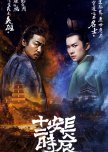
A highbrow production with broad appeal.
The Longest Day in Chang'an is an immersive, visually stunning, culturally authentic and thrilling journey back over 1000 years in time to Lantern Festival in Chang'an at the peak of the Tang Dynasty. This is a highbrow and very demanding drama that is immensely enjoyable even if taken simply at face value. The viewer gets to decide how much they wish to invest in it. The production basks in rich historical and cultural detail that marvels over the intellectual, political, legal, administrative, military, cultural and scientific sophistication of Chang'an and the Tang Dynasty more broadly. The faithfulness to historical accuracy and strong edu-drama aspect to this show has history buffs raving with ecstasy. As a layman, the finer nuances would be lost on me were it not for the many knowledgeable insights on this and other sites. That doesn't appeal to everyone and some have remarked on the frequent historical and cultural digressions that interrupt the story-line. My simple take is that "smart fillers" are better than the nonsensical fillers that other dramas spam us with.The absolutely stunning cinematography is the first and most consistent impression throughout - every frame is beautifully angled to create a visual, vibrant feast for the eyes. Even flames from explosions burst in an artistic pattern of controlled natural assymetry. The production is not shy about indulging in artistic license and is littered with lithe and gorgeously willowy Tang ladies with only one small section acknowledging more ingrained images of the classical, prosperously rotund Tang lady. A number of Chinese manhua worthy characters are almost casually dropped in among the otherwise characteristically Tang dynasty cast including Djimon Hounson's Gao Le, the menacing African slave-trader and lord of Changán's underworld; a deadly female assassin who is fanatically devoted to her radical master; and a wildly improbable Western Persian Prince priest with impressive kung fu and building leaping skills. At the end of the day, this is very much a work of fiction and suspension of disbelief will be required as the lead characters achieve superhuman physical feats and survive certain death. All of which make for gripping, visually compelling and heart stopping action scenes.
The drama is not an easy, light watch. The first season (24 episodes) opens with the intense urgency of a fast moving, action packed thriller as the two leads Zhang Xiaojing (Lei Jia Yun) and Li Bi's (Jackson Yi) race against time to foil a terrorist plot during the Lantern Festival. The constraint of the 24 hour timeline forces the narrative to alternate between the high speed chase, political machinations around a power struggle and flashbacks that set up the backstory; all threads which converge in the unraveling of the conspiracy. The many plot twists interact with an extensive cast of complex characters from various factions with unclear and/or malleable loyalties in the power struggle between Li Bi's patron the Crown Prince and his powerful rival the Right Chancellor. In short, there is already a lot to take in so the occasional non sequitur cultural or historical digression can come off as one thing too many.
It took me a long time to care for any of the main characters in this show. Even relatively "good" characters are flawed, primarily driven by self interests and had questionable loyalties and morals. It wasn't obvious that Li Bi' s cause, the Crown Prince was more worthy than the Right Chancellor. Zhao Xiaojing's dealings with Gao Le alienated me; especially when it appeared his real motive was to protect the reckless and misguided Wen Ran. That episode and short lived character stayed with me for a long time because it is the first of many times that bad things happen to good people. And that is how good people can end up doing bad things. Thus there are no outright good or bad characters in this show, they are all products of events beyond their control. Time and again the drama explores how circumstances can push any character to act against his innate nature and self interest. It is a very realistic portrayal of the complexity of human nature's capacity for both good and evil and was acted out compellingly by a truly superb cast. I started to understand the true spirit of the drama when the plight of the common man of the Peacekeeper Corps moved the phlegmatic Li Bi to tears and made him their reckless champion. The real "heroes" in this drama are the common people; that is why it intentionally neglects the main characters and does not attempt to make you root for them and does not care if they have a happy ending. It celebrates the hardships and unrecognized capabilities of the nameless, faceless, powerless, voiceless man - from the forgotten soldier that gives his life for king and country to the ordinary citizens of Chang'an. It wants you to see them, hear them and care about them.
Season 2 (episodes 25-48) was much more enjoyable for me as the intensity of the chase abates and the narrative focus really zeroes in on the power struggle and the unvieling of the conspiracy and ulitmate mastermind. Finally the lead characters are also allowed to shine and shine they did. Zhao Yi Wei's Long Bo was the most provocative and masterfully portrayed character in the drama. As his path converges with that of Zhao Xiaojing, we see the many parallels between the one who seeks vengence and the one who fights to keep dreams alive.
I was surprised by how much I fun I had unraveling the conspiracy. It was very well done and largely kept to the unspoken bargain of hiding enough clues in plain sight that I was able to figure much of it out on my own. The motives of the ultimate mastermind were not convincing. While I had my eye on him as a suspicous character early on, I assumed he was just a link in the chain but not "the guy". It was a stretch that was probably one plot twist too many. One of the other suspects may have been a more credible choice.
Of course it is a foregone conclusion that the emperor was the ultimate villian. While the power dynamics between a manipulative and insecure emperor and his most trusted advisor and his heir has been done before, it was still extremely very well done here. I was completely satisfied when the son takes a leaf out of his father's book in the ultimate act of emotional manipulation. Checkmate. This was the most satisfaction I got from the ending. The bigger question of whether good things happen to good people is left open.
This is definitely the most epic, most idealistic, substantive and thought provoking drama of 2019. Its biggest flaw is that it is overly ambitious and tries to take on too many themes. That it came together so well is a feat in and of itself but as a result, it was not always easy to watch and certainly not something I wanted to dive right into after a hard day at the office. That said, I truly believe it is a must watch and may even be more enjoyable if taken more simplistically just for its stunning aesthetics, intrigue and action.
Was this review helpful to you?

The meek shall inherit the earth.
This is a very funny, romantic romp through the antics of an unlikely couple in a marriage of convenience that turns into the real thing. Xu Qingjia is a talented young scholar who jilts a highborn lady to fulfil an old promise to marry Hu Jiao, a butcher's daughter. At surface, they could not be more different - he is book smart, humble, meek and measured in his actions while she is street smart, commercial, direct impulsive and a total gangster when provoked. As Qingjia hilariously navigates the challenges of his new assignment as a backwater county magistrate, they discover their differences are complementary and where it counts, their core values are the same.The surrounding plot of this drama is yet another age old corruption case involving the previous generation with some decent twists. What's different about it is that it unravels slowly over the daily lives and trials of a group of humble merchants and working level government officials. The characters are colourful, often comical and avoid the most cringeworthy familial and love rival archetypes. The romances unfold at a realistic pace and have an honest, down to earth appeal about them. No one character is super smart, infallible or is the main driver of the plot. They all have strengths and weaknesses that make them at times succeed and other times fail. But together it is immensely satisfying to see their combined abilities enable them to prevail over the petty neighbourhood bullies, business rivals and corrupt politicians and win the day with their sincerity, persistence and hard work - the meek shall inherit the earth. Best of all, the ensemble cast is fun, witty and can be very, very funny without being slapstick.
I wouldn't say that the actors are among the best out there (its so great to see Tong Meng Shi/Uncle Wu Zhu from JOL as ML) but everyone delivers very solid performances and the cast somehow just "clicks". I really love how Tong Meng Shi manages to convey the henpecked husband with immense inner courage. Although not a huge Baby Zhang fan, I think she also managed to play the husband training shrew while retaining her femininity. I really enjoyed Gao Zheng and Yu Niang's story as well and I think the casting of Hu Jiao's bovine butcher brother is simply brilliant I laugh just looking at him!
This lively, riotously humorous watch that conveys some grains of wisdom about honour, friendship, love and marriage is a fantastic way to pass some time. I rate it a very enjoyable 7.5/10.
Was this review helpful to you?
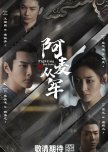
For clown and country.
Fighting For Love is a drama adaptation of a novel with the same Chinese title Ā Mài Cóngjūn/阿麦从军 or A Mai Joins the Army. The novel enjoys an impressive 8.6 score on Douban. It is a female centric story about A Mai, an orphaned noblewoman who seeks justice for her family's betrayal. She joins the army and works her way up to become a fierce and undefeated general. She discovers a greater purpose along the way, which is to defend her country. This takes place during the Northern and Southern dynasties, a period of war, chaos and political turmoil. It is not a romance and there is no real male protagonist; it is about one brave and patriotic woman's awesome journey. I abandoned the book because of its intense and graphic focus on war.Clearly the original story does not fit with the typical male-centric costume drama formula with plenty of romance tropes. What a breath of fresh air, right? Wrong. In the adaptation, Shang Yizhi is elevated to male protagonist and his story arc is as central as A Mai's. Which in and of itself, is not a terrible thing. Like A Mai, Yizhi has a hidden identity and was a victim of foul play. His cause becomes hers as she rescues him and helps him outsmart his enemies. She discovers her military prowess, forms life and death bonds with her troops and finds meaning in defending the citizens of Nanxia. They have a shared purpose and are catalysts for each other's growth. It is natural for attraction or feelings to develop between them though it does not need to be romantic.
The critical fail in the adaptation is they wrote Yizhi as a kind hearted and playful anti-hero character. While some of his comedic scenes are witty and funny, this diminishes him into a parody role. This should be a complex character who does consequential things; a once carefree young nobleman whose world changes overnight. Instead, the writers stuck him with a love brain and Peter Pan syndrome until the final arc. As he is pushed first to survive and then to reclaim his birthright, all of his motivations continue to simply revolve around A'Mai. A character that chooses each time to save the girl and let the world rot does not deserve to end up where he does! This devalues A'Mai and the Zhenbei army's achievements and sacrifices into a fight for clown and country. Even though he becomes morally ambiguous and utilitarian at the end, this evolution is too abrupt. His character progression should have begun well before he returned to the capital. Zhang Haowei did his best with this role but the character is just too poorly designed.
A Mai is quite consistently written throughout even though it is difficult to connect with her feelings for Yizhi. Even though she is too lovely to ever be mistaken for a man, Zhang Tianai does a wonderful job with the role. Her mannerisms are very masculine and she literally shakes with rage and hatred in her scenes with Chen Qi. Best of all, she is no Mary Sue in need of constant rescuing even though all the men fall for her. She just has terrible luck with men; she gets involved with a backstabber, a clown and an enemy with a choking fetish. The one good man she meets is brother-zoned, father-zoned and what happens to him is definitely over-kill. Chen Qi is the most interesting and conflicted antagonist and his and A Mai's story is really sad. Wang Ruichang is very charismatic and the fan favorite but his Chang Yuqing has no development and no real story arc. He just pops up whenever something needs to go wrong for the leads.
The first few arcs of this story are quite good and the cinematography and action scenes are pretty awesome. The story falls apart mid-way and snowballs downhill into the palace arc. It is yet another perfectly good drama that is ruined by ignorant and silly romance writers who can't write palace intrigue (i.e., Destined, Legend of Zhuohua, Wonderland of Love etc etc). This arc is ridden with predictable villains, plot holes, clichés and a flabby dancing emperor who looks like a sloppy fashion mistake. To my surprise, the story comes together again in the final episodes to end fittingly and on a strong note.
It is not easy to rate this because there are many good parts. The first 12-15 episodes and the ending is good and worth ~8 but the middle and dreadful palace arc are only worth ~6+. I think ~7.5 overall is fair but I am only going to call it a 7.0 because the production deserves to be spanked for desecrating a fantastic novel.
Scroll down for SPOILER ending thoughts.
ENDING SPOILER
The final showdown between A Mai and Chen Qi is exciting and moving and it finally gives her closure. Poor Chen Qi is such an interesting, conflicted and ultimately tragic character it is a shame he was not better fleshed out. In the end he probably loved A Mai best.
I don't believe it is in character for A Mai to go off with Chang Yuqing at the end. His feelings for her are not better developed than Yizhi's and at least in the drama, they are one-sided. He is a rising star in Beimo and if A Mai were to marry him, she would have to defect to the enemy to be another caged bird as the wife of a Marquis. After just escaping the terrible fate of being the favorite concubine of an emperor?!? As advisor Xu points out, the countries are at perfect stalemate because their top generals A'Mai and Chang Yuqing don't really want to fight each other. There is peace with them glowering fiercely at each other across the border. A Mai is simply setting off for a well earned 3-year vacation while Beimo's internal palace politics play out. It is a perfect, strong independent woman ending in the spirit of the original novel; one that says A Mai does not have to be someone's arm candy to have a meaningful life.
X
Was this review helpful to you?

Fresh twists on old cliches.
At first glance, Autumn Ballad looks like just another light historical romance featuring a strong, independent heroine with 21st-century attitudes and aspirations. Yet with a chock full of fresh twists on old cliches, this manages to surprise and delight with an all too familiar tale of a lowly illegitimate daughter who finds love most unexpectedly on her quest for self-determination. This well-told story with an authentic voice is carried by Xu Zhengxi and Qiao Xin's heartfelt performances which make me invested in their characters before I even like them.What I like most about Qiu Yan is that she is really not that nice or always that smart. Phew, what a welcome relief from the all too common suffocatingly flawless heroines. This is where notably Yu Zheng's recent, much higher budget projects fall way short by comparison despite big-name actresses. Trapped and exploited by her low birth status, Qiu Yan is the anti-Cinderella - her stepmother is her fairy godmother; she gives as good as she gets to her step-sisters and her mysterious prince leaves her a fan at the stroke of midnight. She tries for the best hand from the cards she is dealt and if she has to use a few people or step on toes along the way, so be it. She can be as harsh, selfish, and unforgiving as she is brave, capable, and loyal. She schemes, miscalculates, and makes mistakes with real consequences for herself and for others. I don't always like or agree with her but can understand her desperation and humanity.
Liang Yi is a pretty gray character which makes him my kind of male lead. Beneath his icy, civilized veneer he is a calculating, manipulative, ends-justify-the-means kind of guy with an agenda and he plays a long game. His path crosses with Qiu Yan repeatedly over the course of his investigations as head of the powerful Firewood Bureau. From the get-go, Liang Yi sees through Qiu Yan's machinations with contempt and tries to frustrate her designs on Qin Xuan. But he stops short of throwing her under the bus, perhaps in silent acknowledgment of his own utilitarian nature. When their interest align they agree to collaborate and are unflinchingly honest with each other about what's in it for them. In doing so, they also reveal the better sides of their nature and as they grow on each other, I fall for them. Qiu Yan is no damsel in distress in need of rescuing and Liang Yi can be as much cad as a knight in shining armor. They are kindred spirits and when they join forces, the sum of the parts is greater than the whole. It is inevitable that conflict and antagonism spark mutual awareness and passion. Their repartee is witty and the dialogue humorously highlights universal truths about human nature and the role of women in society. Is it too contemporary to be realistic? Probably but who cares?
This drama ought to be the gold standard for how realistic, believable relationships should be developed and portrayed. Xu Zhengxi really captures the essence of how Liang Yi's feelings for Qiu Yan evolve from dislike and distrust to grudging respect and consternation when it dawns upon him that he added to her burdens. His ironic, disbelieving expression as he comes to terms with his feelings for her kills me every time. This is by far the best-acted, anchor performance in the drama, elevated by the OTP's undeniable screen chemistry. While Qiao Xin stages a convincing, empathetic complimentary act, she falls short in her crying scenes.
The supporting characters are also mostly well-written and I particularly appreciate the balanced point of view with respect to the sibling rivalry between Qiu Min and Qiu Yan. Both Qiu Min and Qin Xuan are less thoughtfully written but despite their character flaws, they both get a pretty raw deal. The writers seem to know how to design layered and interesting characters but don't know how to finish their stories. Too many characters get outcomes (good and bad) that are underserved. There are so many gratuitous deaths I wonder whether they were running out of money.
Though far from a masterpiece of suspense and intrigue, the overarching conspiracy that loosely connects the cases moves at a fast pace and is quite well conceived and not just contrived to allow the couple to discover each other. It is a story that has enough momentum and characters with agency that the ending should write itself. Instead, with about 6 episodes to go, the writing inexplicably deviates into flashbacks, forced angst, melodrama, and excessive plot twists that culminate in a just barely satisfactory ending. If not for the sag towards the end, I would rate this production that shines in spite of its modest budget better than a very enjoyable 8/10.
This is not a fairytale but that is what makes it so much fun. It is well worth watching for the fascinating and hilarious relationship dynamics alone.
Was this review helpful to you?

The saddest happy story.
This is a very simple, funny, and moving story. Twenty-five-year-old Qi Shuo is utterly devastated when his mother Qi Yue dies at an early age after a difficult life. He travels back in time to change her life. The teenage Qi Yue is just a somewhat lonely, happy-go-lucky young girl with no goals or ambitions. She hilariously accepts that she has an adult son and after some initial reluctance, happily goes along with his machinations without looking too deeply into his assertions. She is that kind of oddly naive, scratch-on-the-surface, go-along-get-along kind of person, which is why her life gets so messed up. Qi Shuo is determined to make her go on to university and marry Lu Xiao, a gifted physics student and more importantly, a good man.The unconventional, comedic, and touching mother-son dynamics between a young man who cajoles, threatens, bullies, badgers and manipulates his teenage mother in line is the best thing about this drama. Qi Yandi and Liu Yitong's heartwarming chemistry and goofy humorous antics as they pursue Lu Xiao had me in stitches. This trio of young main actors really impressed me with their spontaneous and brilliant use of comedy to convey deep emotions. Arguably Lu Xiao is the less interesting role but Wu Difei hits all the right notes with his portrayal of a goofy, romantic and insanely hot nerd. The way his Lu Xiao silently sees everything and steps up to take the baton from Qi Shuo adds a resonating depth to this otherwise archetypal character. Qi Landi also compels as the effervescent Qi Yue who each time lives joyously in the moment, oblivious to any undercurrents until after the point of no return that leaves her shattered. But it is Liu Yitong's stunning portrayal of the quirky, intelligent, diabolical and selfless Qi Shuo, a young man-child that completely floors me. His Qi Shuo is a character that makes me want to laugh as hard as I want to weep. His impish, unadulterated joy as he basks in Qi Yue and Lu Xiao's happiness and affection with the barest sheen of moisture in his eyes is iconic. There is no justice in the drama world if this young actor doesn't go places.
This is a very entertaining and very funny drama that makes it easy for me to forgive its flaws from the choppy editing to some plot holes. It is not perfect and there are some digressions that including Qi Shuo's mini romance that are unnecessary. Even though unlike Qi Yue, I could see the inevitable ending speeding toward me like the white truck of doom, I was still shaken. Despite disconnected cuts that suggest the heavy hand of censorship towards the end, the final message remains intact - " The past is already gone, the future is not yet here. There's only one moment for you to live and that is the present moment" - Buddha.
This is far from a perfect drama but it is still a story that will stay with me for a long while. It is quite simply the saddest happy story about the absolute, unconditional love between a child and their parent. I rate this as a very heartwarming and funny 8.0/10.0.
Was this review helpful to you?


 67
67 279
279 8
8 2
2 6
6 2
2 2
2 1
1 1
1 5
5 1
1 1
1 1
1 2
2 2
2 2
2 4
4

















